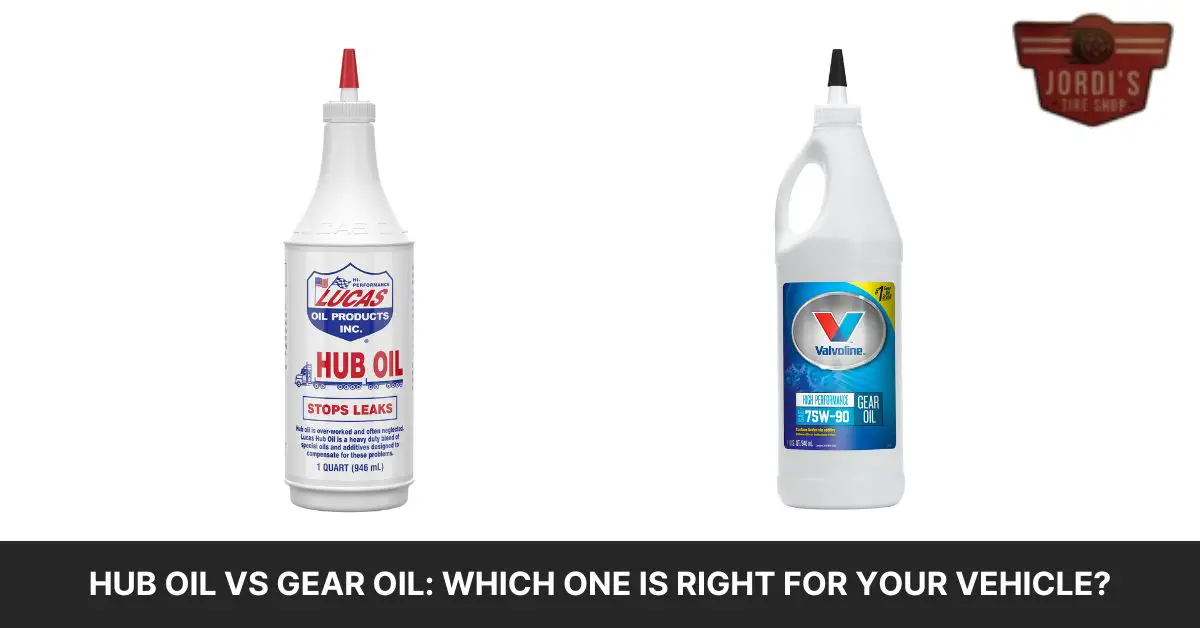Navigating the world of automotive lubricants can often feel like trying to learn a new language. But don’t worry, we’re here to translate. Today, we’re diving into the differences between hub oil and gear oil, two fluids that play crucial roles in keeping your vehicle running smoothly. Understanding these differences not only helps in making informed decisions about your vehicle’s maintenance but also ensures its longevity and performance.
At first glance, hub oil and gear oil might seem interchangeable. After all, they both lubricate moving parts to reduce friction and wear. However, the devil is in the details. Each oil is formulated to meet specific demands of the parts they lubricate, which means using one in place of the other could lead to less than optimal performance or even damage. Let’s explore what sets them apart and why it’s important to use the right one for the right job.
Understanding Hub Oil and Gear Oil: Definitions and Basics
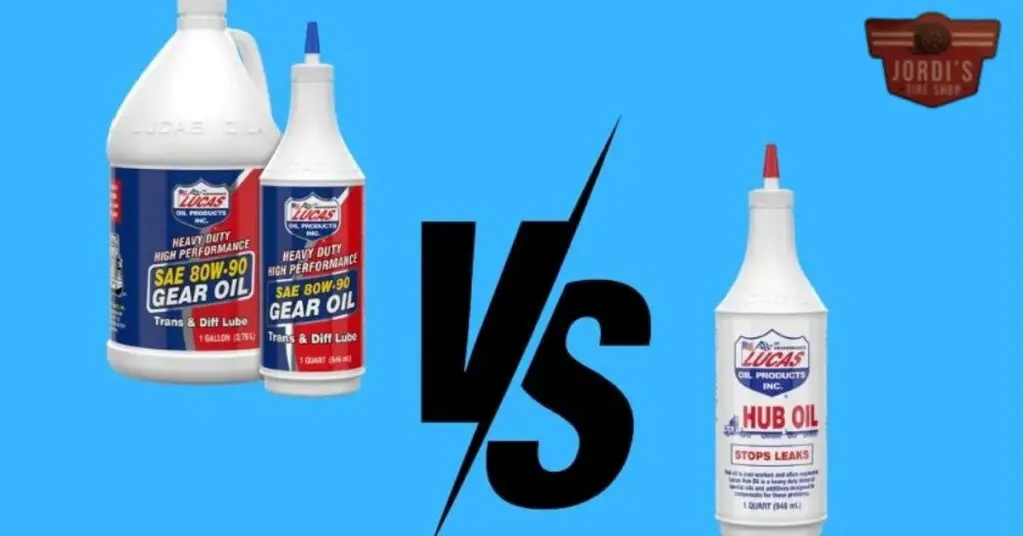
Following the emphasis on their distinct yet equally pivotal roles in keeping a vehicle running smoothly, let’s delve into the basics and definitions of hub oil and gear oil. These lubricants, critical for reducing friction and wear, are tailored to meet the unique requirements of the vehicle parts they serve.
Hub Oil is specifically designed for wheel hubs, playing a crucial role in protecting bearings and ensuring their longevity. Wheel hubs, integral in enabling wheels to rotate freely, demand a lubricant that can withstand high temperatures and pressures while preventing contaminants and moisture from causing damage. Hub oil’s viscosity and formulation are thus optimized to meet these challenges, safeguarding the hub components from corrosion and wear.
Gear Oil, on the other hand, caters to the needs of gearboxes and differentials. Gears undergo considerable stress due to constant meshing, sliding, and transfer of heavy loads. Gear oil is formulated with additives that protect against extreme pressures, minimize wear, and extend the lifespan of the gears. Its viscosity is chosen based on the specific requirements of the gear system it serves, ensuring smooth gear shifts and operation.
Both hub oil and gear oil contain additives that enhance their performance. These additives might include anti-wear agents, rust inhibitors, and detergents, tailored to combat the specific challenges faced by each component. However, the concentration and nature of these additives differ significantly between hub oil and gear oil, underlining the importance of using each lubricant in its intended application.
While hub oil and gear oil share the primary goal of lubrication, their specific formulations and applications highlight the need for precision in selecting the appropriate lubricant. This ensures not only the optimal performance of vehicle parts but also their longevity, ultimately contributing to a smoother and safer driving experience.
Key Differences Between Hub Oil and Gear Oil
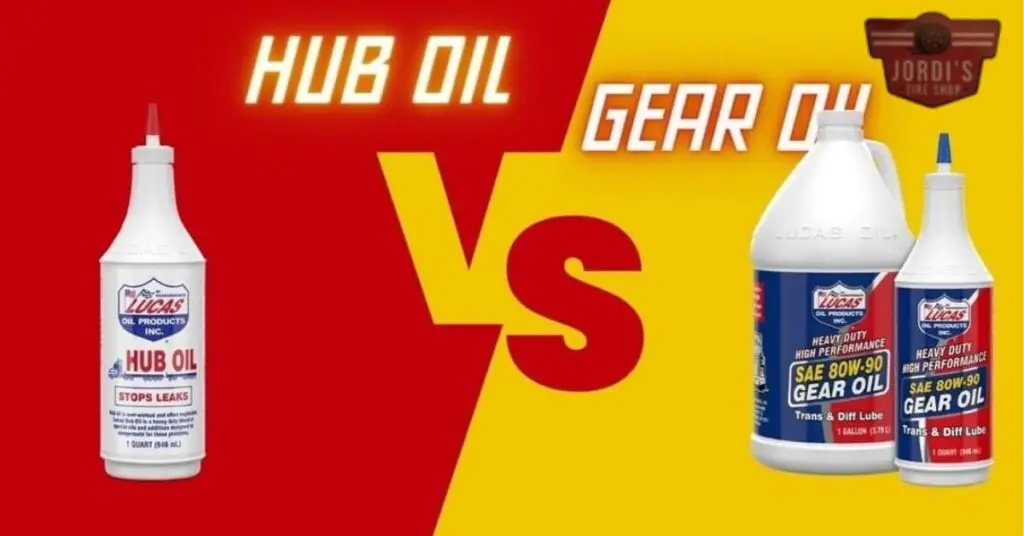
After exploring their definitions and basic functions, let’s dive into the key differences between hub oil and gear oil, which are crucial for maintaining vehicle performance. Despite both being integral in reducing friction, they cater to very specific and distinct parts of a vehicle, with formulations reflecting their unique roles.
Firstly, viscosity, a measure of a fluid’s resistance to flow, varies significantly between these two oils. Generally, gear oil possesses a higher viscosity to cope with the shear stress encountered within gearboxes. In contrast, hub oil often has a lower viscosity, optimized for the less demanding environment of wheel hubs. This difference ensures each oil can offer the best protection for the components they serve.
Additives present another critical distinction. Gear oil contains additives like sulfur-phosphorus compounds that provide extreme pressure (EP) protection, vital for the metal-to-metal contact situations gears often face. Hub oil, while also containing additives, focuses more on resisting oxidation and protecting against rust and corrosion, reflecting the different challenges wheel hubs face compared to gearboxes.
Thermal stability varies between the two, as gear oil is designed to withstand the high temperatures generated by gears under heavy loads. Hub oil, although also resistant to heat, is formulated with a different balance, prioritizing the prevention of overheating in the wheel hubs but not necessarily to the extreme conditions seen in gearboxes.
Lastly, application specificity underlines why using the correct type of oil is non-negotiable. Gear oils are formulated specifically for the high stress and load of gear systems, while hub oils are tailored for the wheel hub environment, which does not experience the same levels of stress and shear. This specificity ensures each component receives the appropriate level of protection and lubrication, thereby extending the longevity and improving the performance of each vehicle part.
Understanding these key differences aids in making informed decisions about which oil to use, ensuring our vehicles run smoothly, efficiently, and safely.
The Importance of Choosing the Right Oil for Your Vehicle
Choosing the right oil for vehicle components, such as wheel hubs and gearboxes, is crucial for several reasons. Firstly, it ensures the longevity and reliability of these parts. Hub oil, designed for its specific role, provides optimal protection against oxidation and rust for wheel hubs. In contrast, gear oil, with its higher viscosity and extreme pressure (EP) additives, is critical for the proper function and durability of gearboxes and differentials.
Selecting the correct oil type enhances vehicle performance, enabling smoother operation. For instance, the right gear oil facilitates effortless gear shifts, while suitable hub oil contributes to a smoother ride by efficiently lubricating the wheel bearings. Such specificity in lubrication significantly reduces the risk of mechanical failures, which can lead to costly repairs and downtime.
Furthermore, the appropriate use of hub and gear oils plays a pivotal role in safety. Proper lubrication prevents overheating and part failure, two common causes of vehicle accidents related to mechanical malfunction. This aspect underscores the importance of understanding and applying the right type of oil to each component of the vehicle.
Additionally, using the correct oil can result in better fuel efficiency. Adequate lubrication reduces friction between moving parts, requiring less energy (fuel) for operation. Over time, this can translate to noticeable savings on fuel costs, making the selection of the right oil both a practical and an economical choice.
Lastly, it’s essential for compliance with warranty requirements. Many vehicle manufacturers specify the use of certain types of oils for different components. Using the wrong oil can void warranties, leaving the vehicle owner liable for any resulting damage or malfunctions.
Understanding the differences between hub oil and gear oil and choosing the appropriate one for each component of the vehicle is pivotal. It ensures enhanced performance, increased safety, improved fuel efficiency, and compliance with warranty requirements, all of which contribute to a better driving experience and longer vehicle life.
Top Picks for Hub Oil and Gear Oil
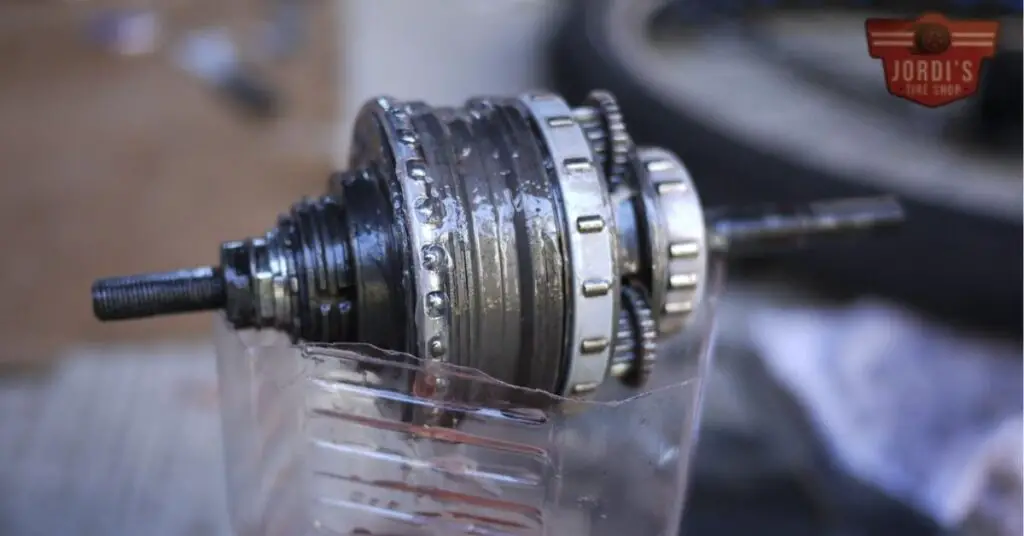
Building on the essential understanding that selecting the right oil can significantly impact vehicle performance and longevity, we’ve rounded up some of the best hub and gear oils on the market. These products stand out for their quality, performance, and compatibility with a wide range of vehicles.
Hub Oil Recommendations
- Lucas Oil Heavy Duty Hub Oil: Lucas Oil is renowned for their commitment to quality. Their Heavy-Duty Hub Oil excels in preventing rust and oxidation, ensuring that wheel hubs run smoothly.
- Royal Purple Synthetic Bearing & Hub Grease: For those seeking advanced protection, Royal Purple’s synthetic formula offers superior performance, extending beyond traditional hub oils by providing exceptional water resistance.
Gear Oil Recommendations
- Mobil 1 Synthetic Gear Lubricant: Mobil 1’s gear lubricant is designed for both high-performance and standard vehicles. Its synthetic base fluid and advanced additives protect against wear, even under extreme conditions.
- Valvoline High-Performance Gear Oil: Valvoline’s gear oil is crafted for heavy loads and high temperatures, making it ideal for vehicles that operate under severe conditions. Its formulation ensures optimal gear efficiency.
- Amsoil Severe Gear Synthetic Gear Lube: Amsoil’s product is tailored for the most challenging environments, offering top-notch protection for gears and bearings. It’s especially suitable for high-demand applications, such as racing or heavy-duty hauling.
Each of these products offers unique benefits, but they all share a common goal: ensuring your vehicle’s hubs and gears are well-protected. Choosing the right oil, you’re not only safeguarding these critical components but also optimizing your vehicle’s performance and longevity. Whether you prioritize synthetic formulas for their high resistance and performance or specific additives designed for your vehicle type, there’s a product that meets your needs. Remember, consulting your vehicle’s manufacturer specifications can guide you to the best choice, aligning with warranty requirements and ensuring the longevity of your vehicle.
Maintenance Tips for Optimal Performance
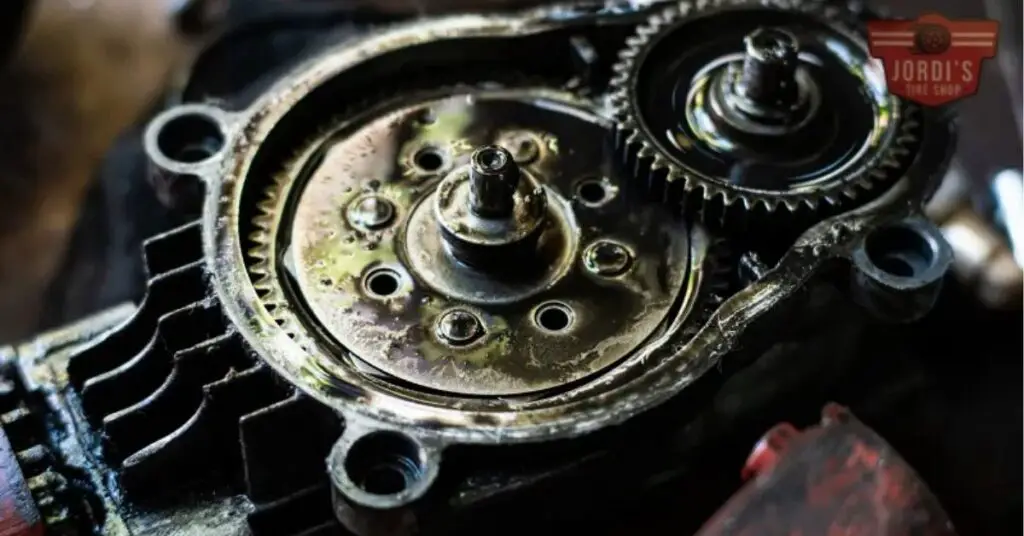
After selecting the right hub and gear oils, such as those from Lucas Oil, Royal Purple, Mobil 1, Valvoline, and Amsoil, maintaining optimal performance becomes the next critical step. Ensuring you adhere to vehicle specifications and manufacturer guidelines not only prolongs the lifespan of your vehicle but also maintains warranty compliance. Here are some maintenance tips to keep everything running smoothly.
Regular Checks and Changes
- Monitor Oil Levels: Frequently check oil levels in both the wheel hubs and gearboxes to ensure they’re within the recommended ranges. Low levels can signify leaks or consumption issues, necessitating immediate attention.
- Change Oil as Recommended: Follow the manufacturer’s guidelines on when to change the hub and gear oils. Over time, oil loses its efficacy, and failure to replace it can lead to increased wear and tear.
Use Quality Products
- Invest in Quality Oils: Opt for high-quality oils like those we recommended. They provide better protection and performance, ultimately saving costs on repairs and replacements.
- Quality Tools and Parts: Use branded or OEM parts and tools during maintenance to prevent damage and ensure compatibility.
Professional Inspection
- Regular Professional Checks: Have a professional mechanic inspect your vehicle’s wheel hubs and gearboxes regularly. They can spot issues you might miss and recommend preventive measures.
- Adhere to Service Intervals: Don’t skip scheduled service appointments. These are pivotal in identifying potential problems before they become major issues.
- Adjust for Operating Conditions: Adjust maintenance intervals based on your driving conditions. Harsher conditions demand more frequent checks and changes.
- Temperature Considerations: Be mindful of temperature impacts on oil viscosity and performance. In extreme conditions, consult a professional for advice on the best oil products.
Following these maintenance tips ensures that using the right hub and gear oils translates into tangible benefits in performance and longevity. Regular maintenance not only keeps your vehicle running at its best but also supports the initial goal of enhancing performance, preventing mechanical failures, and improving overall safety and fuel efficiency.
Pros and Cons of Hub Oil vs Gear Oil
Understanding the advantages and disadvantages of hub oil versus gear oil plays a pivotal role in keeping our vehicles running smoothly. Each of these lubricants serves distinct purposes in automotive maintenance, catering to different components of a vehicle.
Pros of Hub Oil
- Specialization for Wheel Hubs: Hub oil is formulated to protect and lubricate wheel bearings and hubs, which are crucial for the wheel’s rotation and overall vehicular motion. This specialization ensures optimal performance and longevity.
- Reduced Friction: It effectively reduces friction in the wheel hub assembly, leading to smoother operation and less wear over time. This also contributes to improved fuel efficiency as the wheels turn more freely.
- High-Temperature Resistance: Hub oil can withstand high temperatures without breaking down, which is essential for parts that generate a lot of heat due to friction.
Cons of Hub Oil
- Limited Application: Its specialized formula means it’s not suitable for use in other parts of the vehicle, like the gearbox or engine, limiting its versatility.
- Regular Maintenance: Wheel hubs may require more regular maintenance and oil changes to ensure optimal performance, especially in harsher operating conditions.
Pros of Gear Oil
- Versatility: Gear oil is designed for the high-pressure needs of gearboxes but can also be used in differentials and transfer cases, making it a more versatile option.
- Protects Against Wear: It provides excellent protection against wear and tear, thanks to its high viscosity and additives designed to handle pressure.
- Longevity: With gear oil, gearboxes often experience increased longevity thanks to the robust lubrication and protection provided.
Cons of Gear Oil
- Not Suitable for Wheel Hubs: Its viscosity and formulation might not be ideal for the specific needs of wheel hub bearings, which could lead to inadequate lubrication or even damage.
- Possible Contamination: Gear oil can be more susceptible to contamination from metal particles and debris, which can affect its performance and require more frequent changes.
Weighing these pros and cons, we can make informed decisions about the best lubrication practices for our vehicles. Whether it’s ensuring the smooth operation of wheel hubs with hub oil or protecting the gears with gear oil, using the right product is crucial for maintaining vehicle performance and longevity, echoing our initial goal.
Conclusion
We’ve walked through the essentials of choosing the right lubrication for our vehicles, highlighting the unique benefits of both hub oil and gear oil. It’s clear that each has its role in keeping our rides running smoothly and efficiently. By leveraging the insights and maintenance tips shared, we’re better equipped to make choices that enhance our vehicle’s performance and extend its lifespan. Let’s not forget the importance of quality when selecting our oils. Brands like Lucas Oil, Royal Purple, Mobil 1, Valvoline, and Amsoil offer top-notch options that promise to meet our needs. Here’s to smoother rides and longer-lasting components, thanks to making informed decisions on hub oil vs gear oil.
Related Posts:

